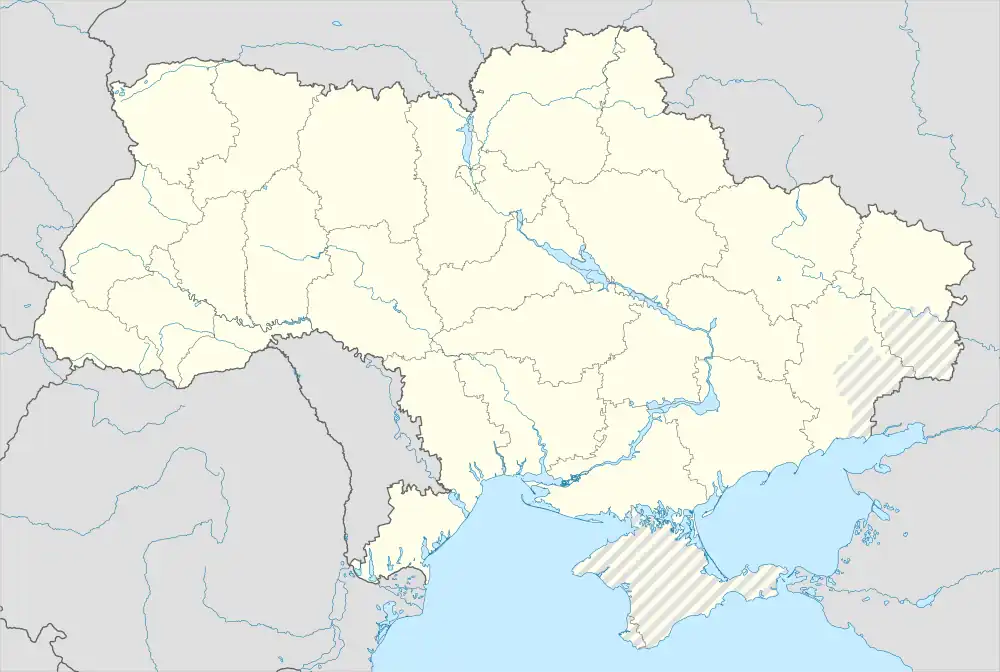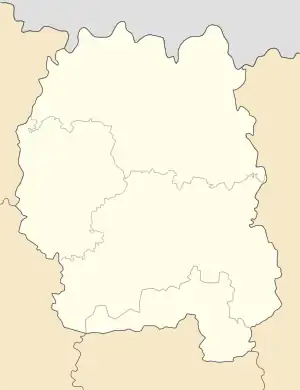Chudniv
Чуднів | |
|---|---|
 Teteriv River in Chudniv | |
 Flag  Coat of arms | |
 Chudniv Location in the Ukraine  Chudniv Chudniv (Zhytomyr Oblast) | |
| Coordinates: 50°3′10″N 28°6′44″E / 50.05278°N 28.11222°E | |
| Country | |
| Oblast (Provence) | |
| Raion (District) | |
| Hromada (County) | |
| Population (2022) | |
| • Total | 5,357 |
| Time zone | UTC+2 (EET) |
| • Summer (DST) | UTC+3 (EEST) |
Chudniv (Ukrainian: Чуднів, Polish: Cudnów, Yiddish: טשודנאוו, Russian: Чу́днов) is a city in Zhytomyr Raion, Zhytomyr Oblast, Ukraine. Prior to 2020, it was the administrative center of the former Chudniv Raion. Population: 5,357 (2022 estimate).[1]
History
Grand Duchy of Lithuania 1471–1569
Polish–Lithuanian Commonwealth 1569–1793
Russian Empire 1793–1917
Ukrainian People's Republic 1917-1918
Ukrainian State 1918
Directory of Ukraine 1918-1919
Soviet Ukraine 1920-1922
Soviet Union 1922–1991
Nazi Germany 1941–1944 (occupation)
Ukraine 1991–present
A significant battle of the Russo-Polish War (1654-1667) was fought near the town in 1660, followed by a treaty between the Polish–Lithuanian Commonwealth and the Cossacks, named after the city. In 1866 Polish Romantic-era novelist Henryk Rzewuski died in Chudniv. The Jewish population was important in the town. During World War II, the Germans occupied the town and kept the Jews imprisoned in a ghetto. In 1941, they were murdered in mass executions perpetrated by an Einsatzgruppen of Germans and Ukrainian policemen.[2]
Notable people
- Alter Chudnover, AKA Yehiel Goyzman (1846–1912), virtuoso klezmer violinist
- Menachem Ribalow – newspaper editor
- Shloimke (Sam) Beckerman – early 20th century klezmer bandleader in New York City
Gallery
 Chudniv by Napoleon Orda
Chudniv by Napoleon Orda The Catholic church today
The Catholic church today Nativity Church in Chudniv
Nativity Church in Chudniv
References
- ↑ Чисельність наявного населення України на 1 січня 2022 [Number of Present Population of Ukraine, as of January 1, 2022] (PDF) (in Ukrainian and English). Kyiv: State Statistics Service of Ukraine. Archived (PDF) from the original on 4 July 2022.
- ↑ "המכון הבין-לאומי לחקר השואה - יד ושם".